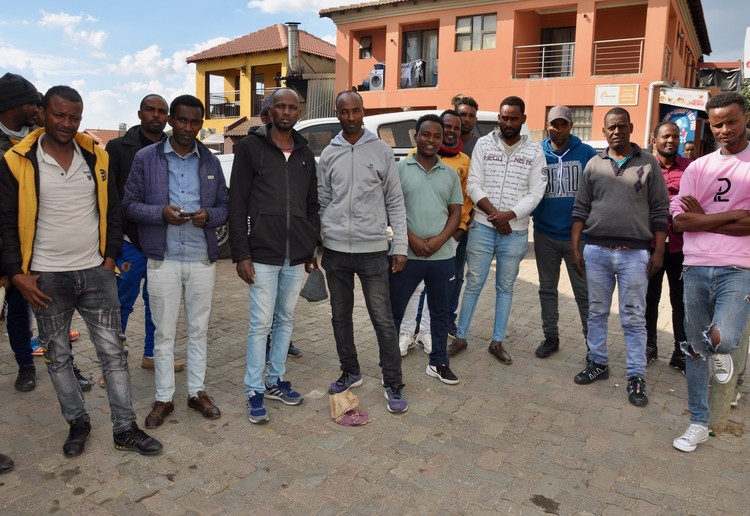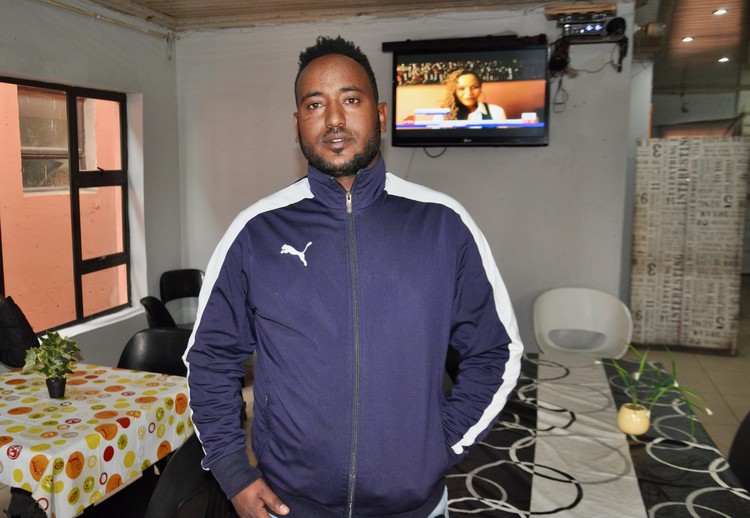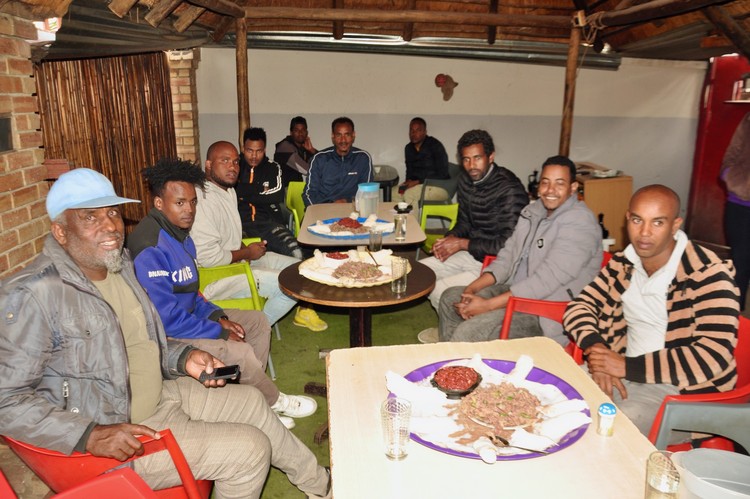Immigrants in Diepsloot say they are scapegoats for crime
Complaints of police harassment
Ethiopian shop owners in Diepsloot say they are targeted for extortion by people in the community, and by police. Photos: Kimberly Mutandiro
- Immigrant shop owners in Diepsloot say they are being scapegoated for the high levels of crime in the area.
- Their shops were looted during anti-crime protests; they pay protection rackets but are still robbed; and several shopkeepers have been murdered.
- They also complain of harassment by police and say they are forced to pay bribes.
- Police say they are conducting an ongoing operation “against illegal immigrants as part of anti-crime operations”.
After weeks of protests against high levels of crime rocked Diepsloot, the situation has calmed down. But immigrant shop owners, mostly Ethiopian, Somalian and Bangladeshi, say they are still being targeted by people in the community and scapegoated for crime in general. Their businesses were looted during the protests and several shops completely destroyed.
Most immigrant shop owners live with their families in Diepsloot. They say they are not given an opportunity to defend themselves or be heard by the community.
Since 20 June, police and Home Affairs officials have conducted almost daily raids, arresting and detaining people even when their asylum and refugee documents are in order, they say. They allege that they are forced to pay bribes before they are released.
Some Ethiopian restaurants were also recently closed by the authorities for operating illegally.
Ethiopian community representative Daniel Sherrif, who also owns restaurants and a grocery shop, said: “We have a total of 311 shops in Diepsloot. As owners we had a meeting with community representatives to have them protect our shops from being looted during protests. For the past few years each shop paid R300 per month.”
He said shop owners also contributed to funerals in the community and gave food parcels to poor people. But all this had made no difference.
“We are not criminals but fathers with families to look after. When the police come, we are meant to feel happy and protected, but instead they take advantage to make money out of us. They demand documents accusing us of having fake documents, yet most of us are refugees and asylum seekers.
“The same officers who demand money from us are the same people working at the Diepsloot police station. Reporting to them about their own crimes makes no sense,” he said.
Another Ethiopian community representative, Desta Markos, said the protection fees had not kept their shops safe. He said they were targeted because many immigrants do not have bank accounts and keep cash on their premises.
“Some of our Ethiopian brothers have been killed during shop robberies over the past three years, but those perpetrators are never arrested. The first thing that police think of when there are complaints about crime is to arrest us for papers,” said Markos.
A number of shop owners have been killed this year. Among those killed were Zalaka Haybano, Dagale Ertiro, Charnat Basha, and Tadela Diga, all of whom left wives and children behind. The Ethiopian community repatriated the bodies to Ethiopia for burial.
“We are not safe in this community. If it’s not community members accusing us of crime and looting our shops, it’s robbers who specifically target immigrant shops, and police who terrorise our brothers, taking money,” said Markos.
“It’s been years of suffering in Diepsloot … Things are not easy, mostly because we cannot renew papers. Where do we run to, because this has been our home for many years?” said Markos.
Immigrants, refugees and asylum seekers we spoke to said they have been struggling to renew their documents at the Desmond Tutu Refugee Centre since the Covid lockdown in 2020. They say they submit through the online renewal system, but never receive a response.
“Operating a business is not a crime, but we are accused and arrested. What are we supposed to do?” asked restaurant owner Tadios Anoye.
Tadios Anoye, a restaurant owner, said he had also been arrested, and his restaurant was closed down last week. He said he had applied for a permit years ago but has never received a response.
“Operating a business is not a crime, but we are accused and arrested. What are we supposed to do?” asked Anoye.
Diepsloot police commander Brigadier Koena Moichela said: “There is an ongoing operation against illegal immigrants as part of our anti-crime operations.”
He said people with expired asylum and refugee documents were released after verification by Home Affairs that the documents were legitimate. He said no reports of bribery had been made.
He said bribery should be reported and people could report this to him personally.
Clifford Dube, of the Diepsloot Community Traders Forum, said: “The problem is that there are certain community representatives who point fingers at immigrants out of jealousy. We have foreigners who are doing productive businesses but are accused of taking away business opportunities.”
“Those coming from other countries unite and assist each other in terms of buying power, which locals cannot do. In some cases, this has sparked envy and jealousy among those community members who then target immigrants.”
Questions were sent to Home Affairs and will be added if received.
Ethiopian shop owners who were arrested and then released on Tuesday enjoy a meal together.
© 2023 GroundUp. This article is licensed under a Creative Commons Attribution-NoDerivatives 4.0 International License.
You may republish this article, so long as you credit the authors and GroundUp, and do not change the text. Please include a link back to the original article.
We put an invisible pixel in the article so that we can count traffic to republishers. All analytics tools are solely on our servers. We do not give our logs to any third party. Logs are deleted after two weeks. We do not use any IP address identifying information except to count regional traffic. We are solely interested in counting hits, not tracking users. If you republish, please do not delete the invisible pixel.





